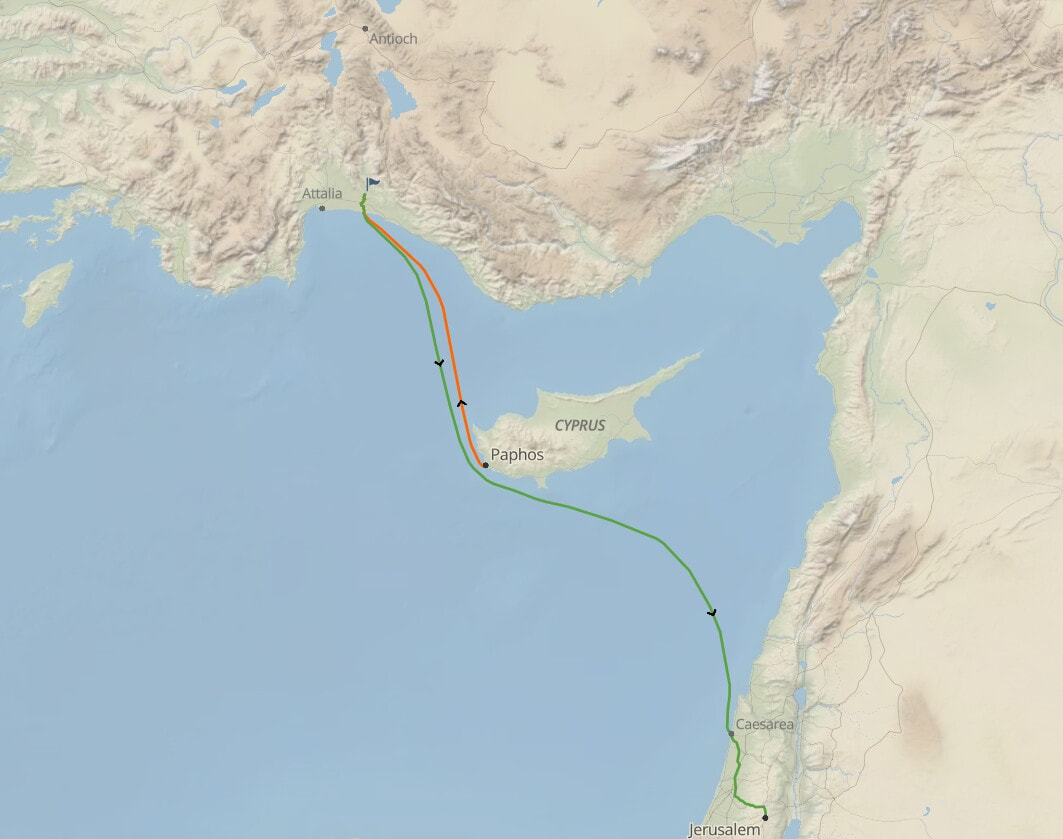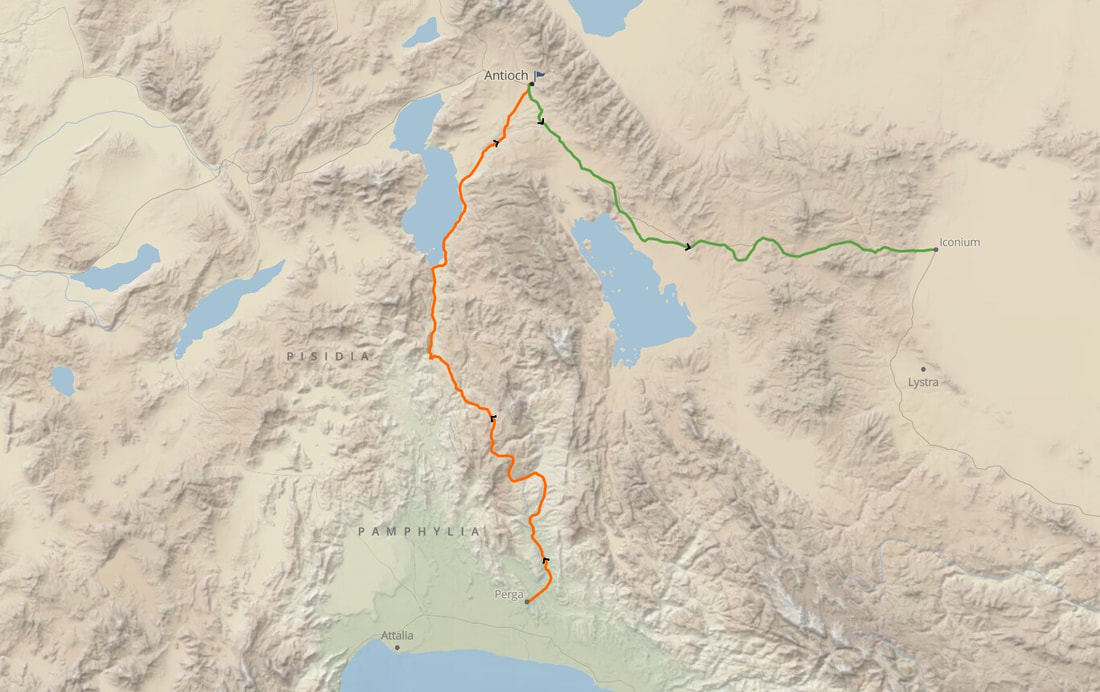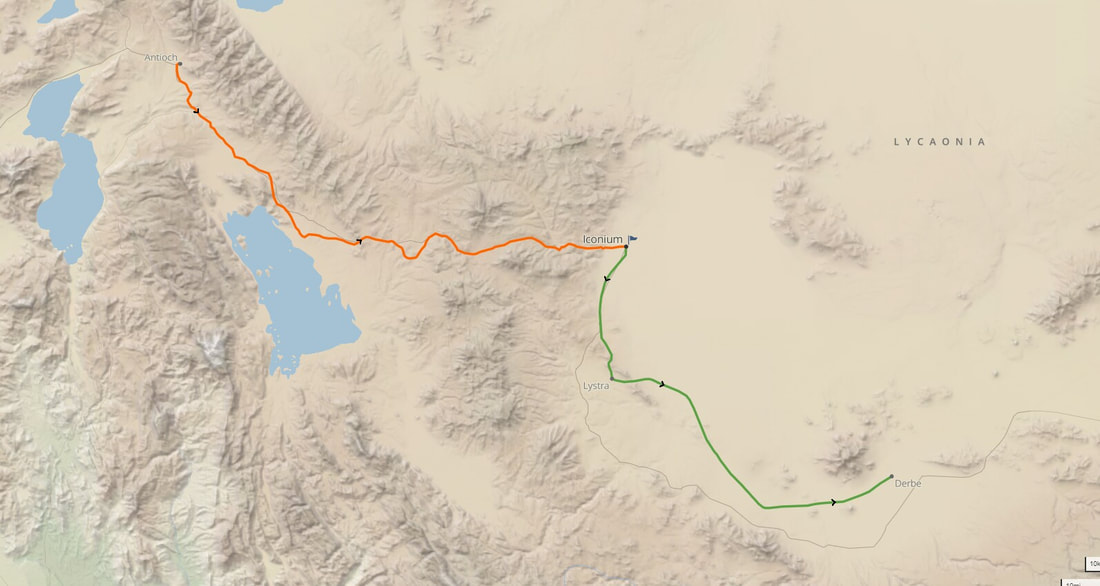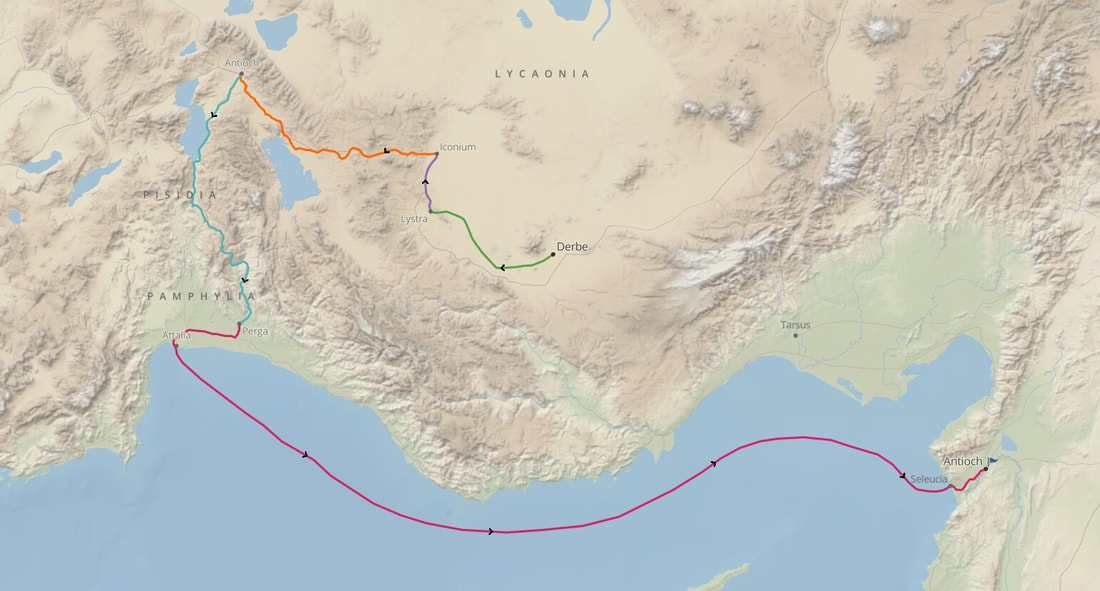| Teacher: Rusty Kennedy Series: Galatians (Acts) |
Rusty's Notes | |
NO OTHER GOSPEL
Galatians 1:1-5 – Paul explains his authority
Paul expresses his anxiety:
An example of what the Church in Galatia might have heard:
Dear brothers of Galatia, we greet you in the Name of our Lord Jesus Christ! We have heard how through the ministry of Brother Paul you have been converted from the worship of dumb idols to serve the true and living God of Israel. We are glad you have made such a good beginning, but we are afraid that there are some very important things about the gospel Paul has omitted to tell you. We ourselves come from the church at Jerusalem which is directed by the very apostles Jesus called and ordained. Paul though is an upstart. Why, he never even knew Jesus while he was on earth and was certainly never commissioned by him as an apostle. True, Paul did visit Jerusalem just after he stopped persecuting us, and there he learned the ABCs of the Christian faith from the true apostles. But the message he now preaches bears no resemblance to theirs. I don’t imagine he even told you about circumcision! Why, this is the very way God has made it possible for you Gentiles to become a part of the New Israel. Jesus did not come to abolish the law but to fulfill it. Circumcision is just as important as baptism—nay, more important, for it will introduce you to a higher plane of Christian living. If you will observe this holy ordinance of the law, God will be pleased with you. We are just now forming a new association of law-observant churches, and we would love for Galatia to be represented! We are the true Christians. Jesus, our great example, pleased the Father by fulfilling the law and so can you![1]
6 I am amazed that you are so quickly turning away from him who called you by the grace of Christ and are turning to a different gospel--
- Astonished, surprised, marveled
- The Galatian believers were not simply “changing religions” or “changing churches” but were actually abandoning the very grace of God!
- To make matters worse, they were deserting the very God of grace!
- God had called them and saved them; now they were deserting Him for human leaders who would bring them into bondage.
- We must never forget that the Christian life is a living relationship with God through Jesus Christ.
- A man does not become a Christian merely by agreeing to a set of doctrines;
- He becomes a Christian by submitting to Christ and trusting Him (Rom. 11:6).
- You cannot mix grace and works, because the one excludes the other.
- Salvation is the gift of God’s grace, purchased for us by Jesus Christ on the cross.
- To turn from grace to Law is to desert the God who saved us.[2]
- What about James 2? – Faith without works is dead.
- The term Judaizer refers to people who zealously promote a Jewish lifestyle according to the law and Jewish tradition.
- Paul insisted that a gospel of legalism which adds work to faith is not the same kind of gospel that he preached and by which they were saved.[3]
- In this case, they were persuading the Galatians to practice circumcision (6:12), as well as observe food laws (2:12) and certain calendar cycles (4:10).[4]
- We not only are saved by grace, but we are to live by grace (1 Cor. 15:10).
- We stand in grace; it is the foundation for the Christian life (Rom. 5:1–2).
- Grace gives us the strength we need to be victorious soldiers (2 Tim. 2:1–4).
- Baptism – Say an oath or sign a commitment to church membership.
- Why wouldn’t the evil one use something that seems good and right to defeat the Church.
- Why isn’t this “grace message” proclaimed more widely?
- Nothing delights the devil more than to disrupt and destroy, insofar as he can, a true work of God.
- Whenever there is a genuine moving of God’s Spirit or a major advance in missionary outreach, we can be sure that Satan and his minions will have a vested interest in casting doubts, sowing discord, and wreaking havoc. [5]
8 But even if we or an angel from heaven should preach to you a gospel contrary to what we have preached to you, a curse be on him! 9 As we have said before, I now say again: If anyone is preaching to you a gospel contrary to what you received, a curse be on him!
- To be anathematized then means far more than to be excommunicated.
- It means nothing less than to suffer the eternal retribution and judgment of God.
- The GNB comes close to capturing the essence of Paul’s tone in this passage, “Let him be condemned to hell!”[6]
- How do you know if you are hearing a different Gospel?
- Grace always leads to peace, but the believers had deserted grace and therefore had no peace in their hearts.
- Grace enables us to suffer without complaining, and even to use that suffering for God’s glory (2 Cor. 12:1–10).
- When a Christian turns away from living by God’s grace, he must depend on his own power.
- This leads to failure and disappointment.[7]
- Paul was being accused of easing the requirements of obedience to the law for Gentile believers (non-Jewish people who believed in Jesus).
- For example, while circumcision was a sign of God’s covenant with Abraham (Gen 17), Paul did not require that Gentile believers be circumcised.
- This made his message more appealing to Gentiles while opening him to the charge of seeking to appease people.[8]
- if the apostle had wanted to please men, he would have remained a zealous Pharisee and promoter of the Law rather than becoming a servant of Christ.[9]
- The test of a man’s ministry is not popularity (Matt. 24:11), or miraculous signs and wonders (Matt. 24:23–24), but his faithfulness to the Word of God.[10]
- “Become all things to all people” - He was willing, if not always happy, to make such adjustments and concessions whenever the missionary situation required that kind of flexibility so long as the foundational principles of the gospel were not being compromised.[11]
- I make decisions every day about this ministry. That is what a leader does.
- I am not really concerned about what people are thinking or saying about me.
- It’s not that I don’t hear it. I just don’t give it any attention.
- But I will not be distracted by nay-sayers and negative people.
- This is only a distraction by the evil one.
- Churches today market specific groups
- Marketing
- Paul’s early Christian experience and his first encounter with church leaders in Jerusalem (1:11–24)
- The summit meeting between Paul and the Jerusalem leaders over the scope and sphere of his missionary work (2:1–10)
- The confrontation with Peter at Antioch leading to the central pronouncement of justification by faith (2:11–21).[12]
11 For I want you to know, brothers and sisters, that the gospel preached by me is not of human origin.
- “I want to make this perfectly clear”
- Paul’s enemies pointed to his nonconformity as proof that his message and ministry were not really of God.[13]
- Paul did not write the Gospel
- Nor did Paul receive the Gospel from men.
- Acts 22 1 “Brothers and fathers, listen now to my defense before you.” 2 When they heard that he was addressing them in Aramaic, they became even quieter. 3 He continued, “I am a Jew, born in Tarsus of Cilicia but brought up in this city, educated at the feet of Gamaliel according to the law of our ancestors. I was zealous for God, just as all of you are today. 4 I persecuted this Way to the death, arresting and putting both men and women in jail, 5 as both the high priest and the whole council of elders can testify about me. After I received letters from them to the brothers, I traveled to Damascus to arrest those who were there and bring them to Jerusalem to be punished.
- “As I was traveling and approaching Damascus, about noon an intense light from heaven suddenly flashed around me. 7 I fell to the ground and heard a voice saying to me, ‘Saul, Saul, why are you persecuting me?’
- “I answered, ‘Who are you, Lord?’ “He said to me, ‘I am Jesus of Nazareth, the one you are persecuting.’ 9 Now those who were with me saw the light, but they did not hear the voice of the one who was speaking to me.
- “I said, ‘What should I do, Lord?’ “The Lord told me, ‘Get up and go into Damascus, and there you will be told everything that you have been assigned to do.’
- “Since I couldn’t see because of the brightness of the light, I was led by the hand by those who were with me, and went into Damascus. 12 Someone named Ananias, a devout man according to the law, who had a good reputation with all the Jews living there, 13 came and stood by me and said, ‘Brother Saul, regain your sight.’ And in that very hour I looked up and saw him. 14 And he said, ‘The God of our ancestors has appointed you to know his will, to see the Righteous One, and to hear the words from his mouth, 15 since you will be a witness for him to all people of what you have seen and heard. 16 And now, why are you delaying? Get up and be baptized, and wash away your sins, calling on his name.’
- “After I returned to Jerusalem and was praying in the temple, I fell into a trance 18 and saw him telling me, ‘Hurry and get out of Jerusalem quickly, because they will not accept your testimony about me.’
- “But I said, ‘Lord, they know that in synagogue after synagogue I had those who believed in you imprisoned and beaten. 20 And when the blood of your witness Stephen was being shed, I stood there giving approval and guarding the clothes of those who killed him.’
- “He said to me, ‘Go, because I will send you far away to the Gentiles.’ ”[14]
- Paul was like a modern day hip hop artist who radically came to understand the saving grace of Jesus.
- Everyone was skeptical!
- But the believers were pretty excited!
15 But when God, who from my mother’s womb set me apart and called me by his grace,
- The OT prophets Jeremiah and Isaiah described their callings in similar ways (Jeremiah 1:5 - I chose you before I formed you in the womb; I set you apart before you were born. I appointed you a prophet to the nations.; Isaiah 49:1 - The Lord called me before I was born. He named me while I was in my mother’s womb.[15]).
- What I have preached, I have experienced myself.
- This is the true Gospel and any other is counterfeit.
- God did it.
- God did it by grace. (not man’s effort or character)
- God did it through His Son.
- God did it for the sake of others.
- Paul is offering support for his claim that the apostles did not teach him the gospel in Jerusalem; rather, his revelation of the gospel came directly from Jesus Christ.[16]
- James became the leader of the Church in Jerusalem.
- The point of Paul’s declaration is clear.
- He formed his theology not by consulting with others, but independently as he sought God’s guidance.[17]
- Acts 9
- When he arrived in Jerusalem, he tried to join the disciples, but they were all afraid of him, since they did not believe he was a disciple. 27 Barnabas, however, took him and brought him to the apostles and explained to them how Saul had seen the Lord on the road and that the Lord had talked to him, and how in Damascus he had spoken boldly in the name of Jesus.[18]
21 Afterward, I went to the regions of Syria and Cilicia.
- Syria lies directly north of Galilee and includes the cities of Antioch (Acts 11:19–30), Damascus (Acts 9:1–19), and Caesarea Maritima.
- Cilicia is the region west of Syria, and includes Paul’s home city of Tarsus.[19]
- Acts 9
- Saul was coming and going with them in Jerusalem, speaking boldly in the name of the Lord. 29 He conversed and debated with the Hellenistic Jews, but they tried to kill him. 30 When the brothers found out, they took him down to Caesarea and sent him off to Tarsus.[20]
- Historians have concluded that he remained there perhaps seven years, until Barnabas recruited him for the work in Antioch (Acts 11:19–26).
- Modern-day “Judaizers,” like their ancient counterparts, reject the authority of Paul and try to undermine the Gospel which he preached.
- In Paul’s day, their message was “the Gospel plus Moses.”
- In our day it is “the Gospel plus” any number of religious leaders, religious books, or religious organizations.
- “You cannot be saved unless …” is their message (Acts 15:1); and that “unless” usually includes joining their group and obeying their rules.
- If you dare to mention the Gospel of grace as preached by Jesus, Paul, and the other Apostles, they reply, “But God has given us a new revelation!”[21]
This was a telling blow to the false teachers. The Jewish Christians in Judea rejoiced in the same gospel the Judaizers sought to undermine.[23]
[1] George, T. (1994). Galatians (Vol. 30, pp. 95–96). Nashville: Broadman & Holman Publishers.
[2] Wiersbe, W. W. (1996). The Bible exposition commentary (Vol. 1, pp. 683–684). Wheaton, IL: Victor Books.
[3] Campbell, D. K. (1985). Galatians. In J. F. Walvoord & R. B. Zuck (Eds.), The Bible Knowledge Commentary: An Exposition of the Scriptures (Vol. 2, p. 590). Wheaton, IL: Victor Books.
[4] Barry, J. D., Mangum, D., Brown, D. R., Heiser, M. S., Custis, M., Ritzema, E., … Bomar, D. (2012, 2016). Faithlife Study Bible (Ga 1:7). Bellingham, WA: Lexham Press.
[5] George, T. (1994). Galatians (Vol. 30, p. 90). Nashville: Broadman & Holman Publishers.
[6] George, T. (1994). Galatians (Vol. 30, pp. 98–99). Nashville: Broadman & Holman Publishers.
[7] Wiersbe, W. W. (1996). The Bible exposition commentary (Vol. 1, p. 684). Wheaton, IL: Victor Books.
[8] Barry, J. D., Mangum, D., Brown, D. R., Heiser, M. S., Custis, M., Ritzema, E., … Bomar, D. (2012, 2016). Faithlife Study Bible (Ga 1:10). Bellingham, WA: Lexham Press.
[9] Campbell, D. K. (1985). Galatians. In J. F. Walvoord & R. B. Zuck (Eds.), The Bible Knowledge Commentary: An Exposition of the Scriptures (Vol. 2, p. 591). Wheaton, IL: Victor Books.
[10] Wiersbe, W. W. (1996). The Bible exposition commentary (Vol. 1, p. 684). Wheaton, IL: Victor Books.
[11] George, T. (1994). Galatians (Vol. 30, p. 101). Nashville: Broadman & Holman Publishers.
[12] George, T. (1994). Galatians (Vol. 30, pp. 105–106). Nashville: Broadman & Holman Publishers.
[13] Wiersbe, W. W. (1996). The Bible exposition commentary (Vol. 1, p. 686). Wheaton, IL: Victor Books.
[14] Christian Standard Bible. (2017). (Ac 22:1–21). Nashville, TN: Holman Bible Publishers.
[15] Christian Standard Bible. (2017). (Is 49:1). Nashville, TN: Holman Bible Publishers.
[16] Barry, J. D., Mangum, D., Brown, D. R., Heiser, M. S., Custis, M., Ritzema, E., … Bomar, D. (2012, 2016). Faithlife Study Bible (Ga 1:18). Bellingham, WA: Lexham Press.
[17] Campbell, D. K. (1985). Galatians. In J. F. Walvoord & R. B. Zuck (Eds.), The Bible Knowledge Commentary: An Exposition of the Scriptures (Vol. 2, p. 592). Wheaton, IL: Victor Books.
[18] Christian Standard Bible. (2017). (Ac 9:26–27). Nashville, TN: Holman Bible Publishers.
[19] Barry, J. D., Mangum, D., Brown, D. R., Heiser, M. S., Custis, M., Ritzema, E., … Bomar, D. (2012, 2016). Faithlife Study Bible (Ga 1:21). Bellingham, WA: Lexham Press.
[20] Christian Standard Bible. (2017). (Ac 9:28–30). Nashville, TN: Holman Bible Publishers.
[21] Wiersbe, W. W. (1996). The Bible exposition commentary (Vol. 1, p. 689). Wheaton, IL: Victor Books.
[22] Christian Standard Bible. (2017). (Ga 1:1–24). Nashville, TN: Holman Bible Publishers.
[23] Campbell, D. K. (1985). Galatians. In J. F. Walvoord & R. B. Zuck (Eds.), The Bible Knowledge Commentary: An Exposition of the Scriptures (Vol. 2, p. 592). Wheaton, IL: Victor Books





 RSS Feed
RSS Feed